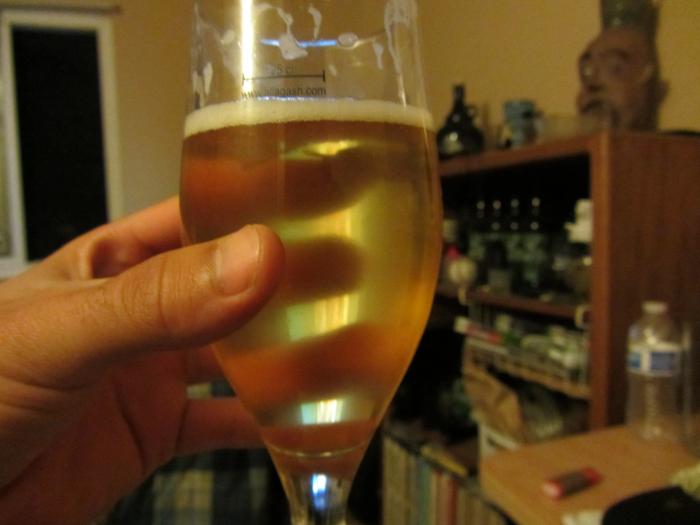1. When I first started brewing, I picked up a kit from my LHBS, and followed the directions and ended up with beer. I thought the beer tasted okay, but it was very dark and ugly, for an IPA. This had me scrambling for answers, most of which led me here to homebrewtalk.com
2. I wanted to know how to make better looking beer. I saw a trend, in adding the extract later in the boil. The reason given was simple, the longer sugar is boiled, the darker it gets, and less cooked it tastes. Over the next few batches, I added the majority of the extract, at the end of the boil, which is often referred to as Flameout. Since then, I have noticed a dramatically better increase, in the appearance of my beer. I still add a small amount of extract, at the beginning of the boil, but always have the flame off, when adding extract.
3. There are many other factor's, that may attribute to better looking beer. For example:
A) How fresh is the liquid extract you are purchasing? -Even with full boils, a light liquid extract, thats been sitting on a shelf, in a container for a couple weeks, leads to a poor looking beer, in my experience. Many brew shops, pre pour common amounts needed for a recipe.
B) Are you able to stir in the extract, well enough to not clump up? -If the extract, is not properly mixed, it may fall to the bottom and scorch the extract, leading to an unpleasant cooked taste. Again, I always turn the flame off, before adding any extract, and steadily pour out a constant amount, while stirring it vigorously in a whirlpool.
C) Are you able to cool the wort down quick enough, to get a cold break? -I started out with ice baths, and after almost dropping 6 gallons of hot wort, lugging it to my ice bath, I said never again and bought a copper immersion chiller. What took an ice bath four hours to cool, now takes an immersion chiller 15-25 mins, to cool properly. And a lot less work, I should mention...
These are some things to think about, when getting serious about brewing.
4. Feel free, to share any questions, comments, or suggestions to this thread. As I'm attempting to edit, my absurdly drunken grammar mistakes, and make this more comprehendible to the new brewers, whom this is meant to help...
5. These Pictures are of two different recipes, but both are IPA's and should look similar in color. I thought, I'd share a pic, from my first home brew, to my most recent. You can tell how dark the beer in the first picture is, and in the last picture, see the improvements.


2. I wanted to know how to make better looking beer. I saw a trend, in adding the extract later in the boil. The reason given was simple, the longer sugar is boiled, the darker it gets, and less cooked it tastes. Over the next few batches, I added the majority of the extract, at the end of the boil, which is often referred to as Flameout. Since then, I have noticed a dramatically better increase, in the appearance of my beer. I still add a small amount of extract, at the beginning of the boil, but always have the flame off, when adding extract.
3. There are many other factor's, that may attribute to better looking beer. For example:
A) How fresh is the liquid extract you are purchasing? -Even with full boils, a light liquid extract, thats been sitting on a shelf, in a container for a couple weeks, leads to a poor looking beer, in my experience. Many brew shops, pre pour common amounts needed for a recipe.
B) Are you able to stir in the extract, well enough to not clump up? -If the extract, is not properly mixed, it may fall to the bottom and scorch the extract, leading to an unpleasant cooked taste. Again, I always turn the flame off, before adding any extract, and steadily pour out a constant amount, while stirring it vigorously in a whirlpool.
C) Are you able to cool the wort down quick enough, to get a cold break? -I started out with ice baths, and after almost dropping 6 gallons of hot wort, lugging it to my ice bath, I said never again and bought a copper immersion chiller. What took an ice bath four hours to cool, now takes an immersion chiller 15-25 mins, to cool properly. And a lot less work, I should mention...
These are some things to think about, when getting serious about brewing.
4. Feel free, to share any questions, comments, or suggestions to this thread. As I'm attempting to edit, my absurdly drunken grammar mistakes, and make this more comprehendible to the new brewers, whom this is meant to help...
5. These Pictures are of two different recipes, but both are IPA's and should look similar in color. I thought, I'd share a pic, from my first home brew, to my most recent. You can tell how dark the beer in the first picture is, and in the last picture, see the improvements.





